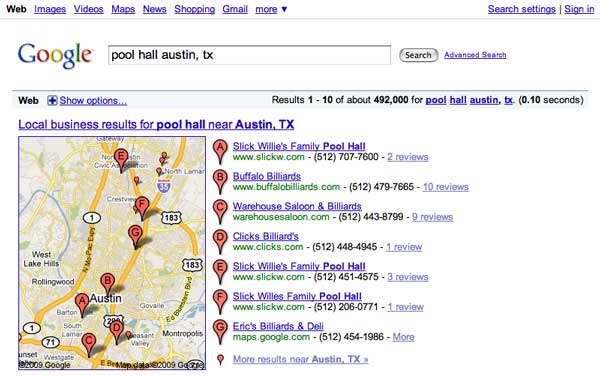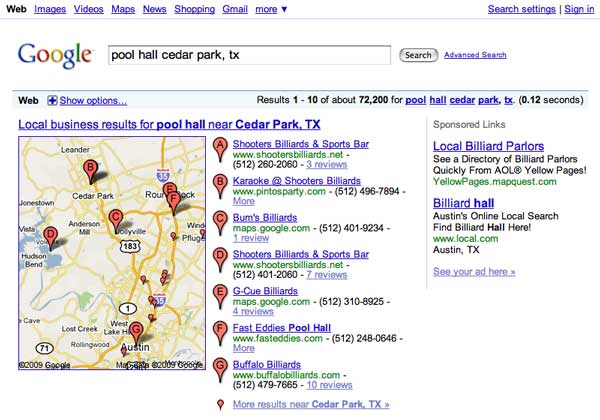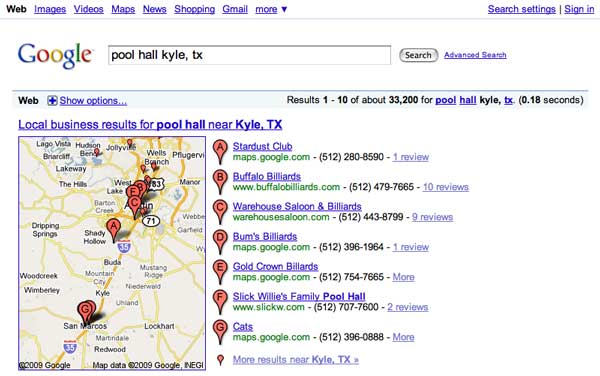- 29 Oct
Proximity to Centroid Still Matters for Google Maps Optimization
Early in the history of business listings being placed on Google Maps, your proximity to the centroid (fancy geometric term for “center”) of your city had a huge impact on your rankings. If you wanted to be on the first page for [pool hall austin, tx], you’d better be located in the center of town.
Over the last couple of years, however, Google has greatly devalued proximity to centroid as a signal in their calculations. With decent optimization, you can rank for [pool hall austin, tx] all over town.

As you can see, the seven listings are fairly evenly distributed across Austin.
However, proximity to centroid still plays a major part in your rankings in the suburbs. For many keyword spaces in smaller towns, Google does not have enough listings to fill the 7-pack. As a result, it pulls listings from the town’s neighbors, often the main city in the area.
For instance, let’s imagine you want to play pool in Cedar Park, TX (just northwest of Austin):

Only one location actually in Cedar Park made it into the top seven. The rest are pulled from the surrounding towns (and Austin). There’s clearly a bias for listings either from towns north of Austin or located in north Austin.
If you want to shoot pool in Kyle (directly south of Austin), your map might look like this:

It doesn’t appear that playing pool in Kyle is possible unless you own a table, but you’re shown listings from as far south as San Marcos and far north as well into Austin.
Only one listing, Buffalo Billiards, is found on all three map results. It is located on the world famous Sixth Street, deep in the heart of Austin. Because of its central location, it was able to fill slots in all those searches in the suburbs.
I’ve seen similar behavior on a number of keyword spaces. It’s clear that when Google is pulling listings across city lines, it would rather grab listings closer to the target city. As a result, being in the center of town still provides a real advantage when competing for listings in neighboring towns.
Not: All screenshots were taken on Wednesday, October 28, 2009, using Paparazzi. As a result of using this software, no personalization should have been in effect.
Read more... - 28 Oct
Guest Post: Are You Maximizing Your Time & Money in Your Business?
If you’re a small business owner, you’re accustomed to doing everything yourself: providing your company’s actual service, sales, admin, bookkeeping, etc. You might be proud of this or else hate it. Either way, certain functions of your company are critical for you to perform, and other aspects take you away from that core, critical work.
If you’re proud of doing everything, you see it as a way to be scrappy, keeping more dollars for yourself. If you hate it, you think you simply can’t afford to hire someone to take the load off. In both cases, you may be failing to see the forest for the trees.
People start businesses for any number of reasons, but two of the main ones are 1) to do something you love and 2) to make money. Are you achieving your goals? Let’s see:
Do something you love
If you’re a computer whiz, you might open an IT company so you can set up networks and fix computers—work you’re happy to do all day long. But if you’re doing your own admin and bookkeeping, then you’re spending a certain number of hours every day or week away from the IT tasks that you actually enjoy! When you do tasks you don’t enjoy, you diminish your overall satisfaction and increase chances of burnout.Make money
Ultimately, we’re all trying to earn a living. Let’s say you’re a CPA billing at $175/hr. If you work 8 hrs/day, you have the potential to earn $1,400/day. If you’re doing your own business support, tasks that cost substantially less than $175 per hour, you are not maximizing your earning potential. In fact, you are literally wasting your time.Makes sense but you’re not sure where to start? First: Figure out the 3–5 most critical tasks that you perform in your business. They’re critical because you’re the only one who knows how to do them or you do them best, or those tasks bring in the most revenue.
Once you’ve identified those tasks, your goal must be to stop doing everything else! (Really.) In Eat That Frog, author Brian Tracy tells the true story of Cynthia. She identified her 3 most critical functions and got her boss’ buy-in to focus only on those tasks (and to eliminate or delegate the rest). He also agreed that if she doubled revenue, he would double her salary. In just 30 days, Cynthia increased her productivity so much by focusing on those 3 tasks that she did indeed double revenues and doubled her salary. On top of it, she actually reduced her daily workday from 12 hours down to 8!
You may still be thinking that you can’t afford to delegate or outsource the rest of your company’s functions. Any time you perform business support functions, you take time away from doing work you can bill or else generating leads and making sales. If your time is worth more than, say, $18/hr, you will make a profit by outsourcing your admin. It’s that simple.
Just imagine what you could achieve if you got to focus on the reasons you started your business in the first place! You would be happier and more successful, and you would make more money. Who can argue with that?
Abigail Mahnke is president of The Outsource Resource , a one-stop-shopping agency for small businesses in Austin, TX, providing a range of business support services that enable companies to stay focused on their revenue and growth, while ensuring that their other critical functions take place. These services include administrative assistance, bookkeeping/QuickBooks, marketing/social media, graphic design, project management, organization and more. She’ll be speaking in more depth on this topic on Friday, 11/6 at the Taking It to the Next Level business conference. You can also visit her booth on Tuesday, 11/10 at the Austin Open 4 Business Conference.
All opinions expressed in guest blog postings are those of the specific post’s author, and may or may not reflect those of Brian Combs or ionadas local.
Read more... - 27 Oct
Brian Combs at PubCon Vegas 2009
Brian Combs, principal of ionadas local, will be speaking at PubCon Vegas again this year, with a pair of sessions on the first day, November 10, 2009:
Interactive Site Reviews: Focus on Organic
11:30am-12:45pm
Live critiques of attendee websites, with actionable advice on how to improve the sites’ search engine optimization.How Do You Optimize For Universal and Personal Search?
2:55pm-4:10pm
Brian’s third time on a PubCon Universal and Personal Searc panel, he will be speaking on how the search engines blend local results with the traditional SERPs.
Read more... - 26 Oct
Guest Post: How Article Marketing Can Help You Even If You Own a Local Business
Getting global exposure for your website and reaching customers all over the world are two perks of Article Marketing, but what if global domination is not your thing?
One of my long-time newsletter subscribers recently emailed me and asked:
What if you own a dry cleaning business in Madison, Wisconsin?
Or you’re a real estate agent in Ontario, Canada?
Or you operate a bakery in Marrakech, Morocco?
If you own a local business and you want to attract customers who are in your neighborhood or city, can article marketing still work for you?
My answer = Yes!
Many of my article marketing clients at IWantMoreProspects.com own businesses that have local clients and customers. They use article marketing to increase their web presence, bolster their website rankings in the search engines, establish themselves as an expert in their niche, and also to generate more targeted traffic to their website.
So, although you may not be looking for national or international attention, you can still benefit from a targeted article submission campaign. Now, when I say “targeted traffic”, I mean that the people who are visiting your website are the type of prospects who might be truly interested in your business. They are not just random passers-by.
How can you get targeted traffic for your local business using article marketing?
To be sure that the traffic you receive is targeted, write about your area of expertise and in your resource box (that’s the author bio that sits below your article) specify the location of your business. This would tell the reader that you only work with people in that location.
Also, if appropriate you could write some articles that specifically deal with your industry in your location. For example, if you are a Real Estate agent in Ontario, Canada, there may be some unique aspects of buying or selling a house that are specific to Ontario.
Here’s one article idea: “10 Upcoming Neighborhoods in Ontario, Canada That You Should Consider Buying a House In”
Then the article would have to deliver on the promise that the title makes. Please resist the urge to mention your location in the title and then write an article that offers generalized info. If you mention your location in the title, you need to provide specific info about that location.
What You Must Remember When You Are Trying to Get Local Attention Using Article Marketing
The main thing to remember is that while we talk about a “global audience”, every one of us who is doing article marketing wants to attract a certain type of person–the type of person who is most likely to be interested in our business.
I don’t know of any website owner who wants every Tom, Dick and Harriet coming to his or her site.
Whether you have a local business or an Internet business that operates worldwide, you still have a target market, and you need to write your articles with that specific group in mind.
So, don’t let the “global exposure” idea intimidate or mislead you. When done correctly, article marketing generates targeted traffic.
You can get traffic that is targeted to your specific location (if that is what you’re going for).
You can get traffic that is targeted to your industry.
You can get traffic that is targeted to people with very specific needs.
You can get traffic that is targeted to people with specific interests.
So start writing articles for your local business. If you’re stuck, grab my Instant Article Writing Templates at StartWritingArticlesFaster.com
Article Marketing Expert Eric Gruber uses the power of articles to create online opportunities for small business owners who want more publicity, prospects and profits. Now, you can get his instant article writing templates that will help you write your articles in 30 minutes or less. Get 3 of his favorite article writing templates for free at TryMyFreeArticleTemplates.com.
All opinions expressed in guest blog postings are those of the specific post’s author, and may or may not reflect those of Brian Combs or ionadas local.
Read more... - 22 Oct
Does Your Business Need Local SEO?
Approximately eighteen months ago, the agency I was with at that time was hired by a company in the vacation travel space. They were seeing a twenty percent drop in traffic from Google, and a nearly twenty-five percent drop in sales from Google.
Meanwhile, their internally-developed ranking tools were telling them that everything was fine. They were third on Keyword A that month, and they had been third on Keyword A the previous month. This was substantively the case for the several thousand keywords they watched.
Among other things, they hired us to determine what had happened.
The change was that Google had started returning a map with ten business listings for the majority of their keywords, which referred to specific geographies around the country. This map was pushing down the traditional, organic search listings to the point that unless you were the first or second listing, you were “below the fold”, meaning one had to scroll down one’s monitor to see the listing.
This map became known as the “10-pack”, and are driven by the Google Local Business Center. (Note: the 10-pack has recently become a 7-pack.)
One of the constants in SEO is that the further down the page you are listed, the less traffic you receive. Consequently, the addition of the 10-pack was a substantial change to Google’s SERPs (Search Engine Results Page). I would argue that it’s the biggest change since Google started placing paid listings above the organic listings on certain queries.
Most disturbing for my client was that not only was traffic from Google dropping, but sales from Google were dropping at a higher rate. Clearly, it was the most valuable traffic that was being lost.
Local SEO (aka Google Maps optimization is a new type of SEO that focuses on causing companies’ Google Local Business Center listings to be returned for particular queries.
So, does your company need local SEO?
If you wish to generate website visits, phone calls, or foot traffic from people in particular geographies, then local SEO is likely appropriate for your business.
To test this theory, you might search on Google for your most important keywords. Is the 7-pack (or one of its cousins) coming up? Even if it isn’t, if your keywords contain local intent, the map will likely be added in the future.
You even might be able to cause your Google Local Business Center listing to be returned for particular keywords, if you work the system correctly.
But that’s a topic for a later post.
Read more...

Leave a Reply
You must be logged in to post a comment.